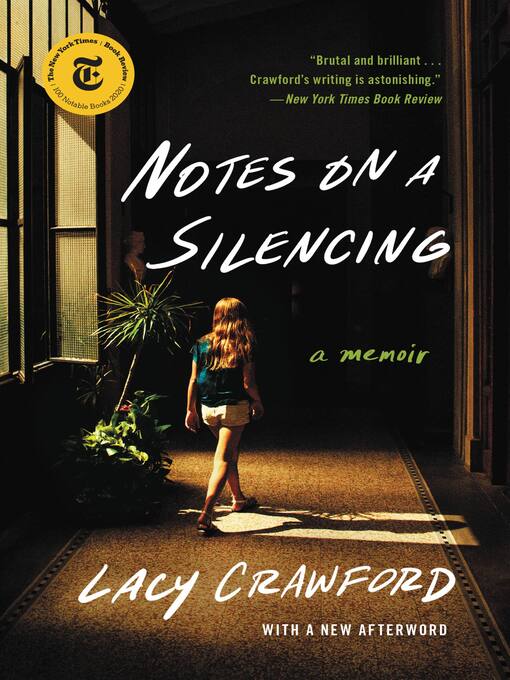
Notes on a Silencing
A Memoir
- اطلاعات
- نقد و بررسی
- دیدگاه کاربران
نقد و بررسی

March 30, 2020
In this devastating memoir, Crawford (Early Decision) writes about being raped at age 15 by two 18-year-old male students at her elite New Hampshire boarding school and the attempt by school officials to cover it up. In 1990, Crawford was lured after curfew to a dorm room at St. Paul’s School, where two students took turns forcing their penises into her mouth. (She contracted herpes as a result.) With measured prose, Crawford talks about the physical and emotional trauma she suffered, and about getting harassed by her assailants’ friends in the days after the attack. When she finally told her mother what happened months later, school officials tried to shame and silence her: one administrator accused her of being promiscuous, and her college prospects were threatened. Crawford carefully exposes the rotten underbelly of the school, whose administrators never reported her assault to police and who, she learned after the school was investigated in 2018, had been orchestrating cover-ups of sexual violence and abuse for decades. “The slur slut carries within it, Trojan-horse style, silence as its true intent,” she writes, eventually realizing that “the opposite of slut is not virtue but voice.” Crawford’s is a stirring memoir of sexual assault and its aftermath.

May 15, 2020
A novelist's account of how she struggled to come to terms with a traumatic sexual assault that the boarding school she attended actively tried to cover up. Crawford entered the prestigious St. Paul's School when she was 14. The daughter of socially ambitious upper-middle-class parents who believed in "the value of education," she immediately felt out of place among her privileged, preternaturally sophisticated classmates. On the first day of school, she discovered that many of her age-mates already had older lovers whom they visited without their parents' knowledge. Other aspects of St. Paul's--racism, social hierarchies, and faculty sexual harassment of female students--also disturbed the author, who was diagnosed with clinical depression, but left her parents "unmoved." The year after she started, Crawford was forced to perform oral sex on two popular senior athletes who threatened to report her for breaking school curfew. She developed a bleeding sore throat the school infirmary diagnosed as stemming from canker sores. Crawford later learned that the school doctor had actually noted she suffered from herpetic lesions. Branded overnight as a "whore" by fellow students, the author soon found herself excluded from female peer groups and scornfully pursued for sex by male students. When her parents became involved, school administrators told them that the "encounter...had been consensual," implied that Crawford already had herpes, and threatened to destroy her Ivy League future if she did not remain silent. Even after detectives found proof of the school's wrongdoing more than 20 years later, Crawford's case was dropped because St. Paul's influence extended deep into New Hampshire state government. Trenchant in its observations about the unspoken--and often criminal--double standards that adhere in elite spaces, Crawford's courageous book is a bracing reminder of the dangers inherent in unchecked patriarchal power. A powerful, topical, and incisive memoir.
COPYRIGHT(2020) Kirkus Reviews, ALL RIGHTS RESERVED.

Starred review from June 1, 2020
Crawford, a journalist and author of the novel Early Decision (2013), begins her first memoir with its central, catastrophic event: past curfew one night in 1990, early in her junior year of high school, or "fifth form," as it was known at her elite New Hampshire boarding school, two senior boys sexually assaulted her. She kept the matter to herself, but a story nonetheless circulated. She then starts from the beginning of her time at St. Paul's, a rigorous institution where Crawford's significant privilege paled in contrast to that of many of her classmates, and decoding hierarchies proved to be its own difficult subject. She found a community through sport, but the assault's rippling effects eroded even that crucial connection. Acknowledging that a storyteller's choices in themselves tell a story, she gives a studied, vulnerable, and maddening account of her near-undoing and the school's absolute obstruction of the truth. She melds her personae as a teenage girl, a survivor, and a skilled narrator, relating what she understood as she understood it, while also revealing her story's upsetting course. Crawford's meditation on the effects of silence, shame, and belief, and the antidotes she had to invent for herself, will add to evolving discussions of sexual assault and power.(Reprinted with permission of Booklist, copyright 2020, American Library Association.)

July 17, 2020
Crawford (Hold Still) explores the effects of sexual assault with visceral force and honesty. After her private boarding school came under investigation for sexual assaults on campus, she came forward with her experience, which occurred decades earlier. Crawford works through complex theoretical issues related to gender, class, and privilege as they intersect with trauma, shame, and silencing. This provides a kind of bridge between issues raised by the #metoo movement and the nuances of sexual assault case investigations with its powerful emphasis on what Crawford describes as the "near impossibility of telling what happened in a way that discharges its power." While the memoir itself is beautifully written, the book also provides a very real corrective to the oversimplification we often make when we think that telling a story, bringing a case to trial, or "winning" in some public way is enough to restore what has been taken from a survivor of sexual assault. VERDICT This brave, brilliant memoir reveals the multifaceted effects of trauma on a survivor's life, the damage done by some of the ways in which disclosures happen, and the power of finding a voice on one's own terms, if and when one feels supported, sustained, and able to speak.--Emily Bowles, Univ. of Wisconsin, Madison
Copyright 2020 Library Journal, LLC Used with permission.




دیدگاه کاربران